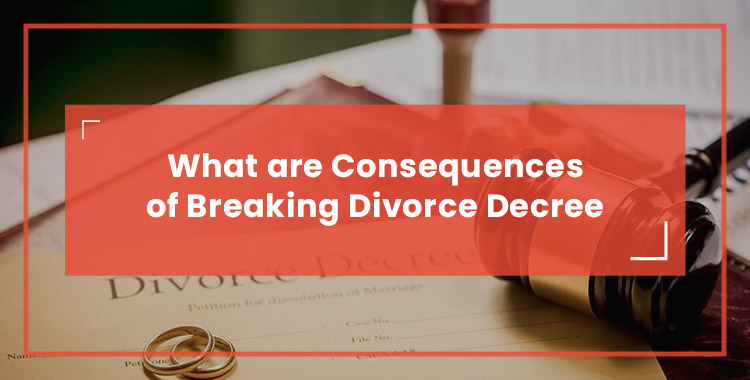Does your spouse deny paying child support or spousal maintenance, even though it was decided on the divorce decree? If so, then this article is the right one for you. Going through a divorce is undoubtedly painful. However, a divorce decree can help you agree with you and your partner because it’s a court order. But what if your partner breaks the decree? In this following article, we will discuss the consequences of breaking the divorce decree and other related information you must know. But first, let’s develop a basic idea about what is a divorce decree: A divorce decree is also widely known as a dissolution decree or divorce settlement agreement. It is a final legal document containing all the clauses, settlements, and arrangements the couples have agreed on while going through the divorce process. In other words, it contains the detail of terms & agreements that both parties have given their consent to follow after the separation. This includes property and asset division, spousal maintenance, child support, child custody, etc. A person can disobey their divorce decree in several ways, including: It usually takes time to divide all their assets and debts. Smaller items must be sorted, and selling real estate or changing the ownership information on the documents might be necessary. As a result, distributing the assets can take a while, even though the decree was signed several days ago. In the meantime, your ex may change their mind. And thus refuse to give you property that is legally yours. Or they may try to delay it as long as possible if there is still an unresolved matter regarding the distribution of assets. In the end, it’s possible that you will not receive all the assets, money, or properties as promised during the divorce settlement. If you disobey child custody and visitation orders, chances are high that you may lose some precious time you could have spent with your child. This activity includes forgetting about scheduled visits or routinely dropping the kids off beyond the promised scheduled time. Although these seemingly trivial matters, these things can be quite upsetting and harmful for the child. That’s why the court is also very strict with this one. After a divorce, managing your finances can be challenging, particularly if your spouse doesn’t pay you the required alimony or child support. Even a few days of late payments could make it more challenging to pay your obligations on time, mainly if you depend on that support. As a result, it can severely affect your credit rating, living condition, and capacity to provide for your child’s basic needs. So, in this condition, you reserve every right to petition the court to enforce the current orders if your former partner consistently misses or delays making support payments. Although a decree is legally binding, in most cases, we found several people not complying with all the terms and conditions outlined in the decree. So, what to do if the ex-spouse violates the divorce decree? Is there anything I can do? Of course, there are plenty of things that you can do against the spouse who didn’t fulfill their obligations based on the divorce decree. The court is very strict regarding this violation of laws, especially if there are no valid reasons behind it. Here’s what to do in cases your ex doesn’t follow up with the divorce decree: If you find your former spouse not fulfilling your needs, then before taking the next step, review the decree again. It will clarify all your doubts and prevent you from fighting for something not included in the decree, such as being late or failing to pay child support/spousal maintenance, even though it is mentioned to pay them on time regularly. Another example can be asset distribution. Like, your former spouse transferred the title of a real estate or any other property under your name even though it was a direct order from the court. If this kind of incident occurs, document all these violations. In the end, it will work in favour of your case. Providing solid proof of the opposing party’s violations of the divorce decision is crucial to aid a successful and effective intervention through the courts. Written conversations and financial records are two examples of evidence that can be used to demonstrate the former spouse’s noncompliance. These crucial documents are meant to strengthen the injured party’s claim when court enforcement occurs. The wronged party has the burden of providing evidence. So, be ready to provide comprehensive documentation and evidence of contempt to support all claims of noncompliance. Submit a contempt court motion in response to the breach of the divorce decree’s provisions. Before starting this process, the injured party should contact the court clerk for guidance on what paperwork to file independently. In this regard, an experienced lawyer will help to decide if the wounded ex-spouse should file a motion for civil contempt of court, a motion for enforcement, or another action. Besides, a lawyer will cover how the ex-spouse will be served with the violation motion and how to submit it. This motion outlines which divorce judgment provisions were broken and explain why the ex-spouse should be punished in contempt of court. The other party must provide proof even when the lawyer represents the ex. Also, the guilty party may be given the opportunity to immediately amend the part of the divorce decree they have breached, or the judge can set a deadline for them to do so. Finally, the court will determine a hearing date. The judge may prescribe the steps an ex-spouse must take to clear themselves of court contempt if the guilty party is determined to be in it. Another possible option is to serve jail time for the duration of the contempt, depending on your state laws. Moving on to the consequences of breaking a divorce decree, there are several punishments that one needs to face. For instance, if your ex-spouse disobeyed a court order to pay child support or spousal maintenance, the court may seize their property, garnish their wages, increase the paid amount or even freeze accounts in the worst-case scenario. On the other hand, if they don’t provide you with parenting time, you can be given more to make up for it. Or, the divorce decree might be changed to ensure compliance. In some circumstances, the other parent can completely lose their rights or may be charged with a crime. Such as loss of driver’s license, passport, or professional licence. As the court issues a decree, you must fulfill them at any cost except for valid reasons. But in an exceptional case, you must also notify the court about it. Otherwise, they will reserve all the right to take legal action against you. In this regard, what kind of issues one will face entirely depends on which kind of provision of the agreement your former spouse is violating. Note: Every state has different rules and regulations to follow. So, based on your state’s laws, the consequences will vary from one another. A divorce decree is a legal binding issues by the court following a divorce. The couple must strictly comply unless wants to experience the severe consequences of breaking the divorce decree. From breaking the marriage to your ex-spouse breaking the decree, all these things can be a lot to take. So, if this happens to you, make sure to take legal support from experts. Only a lawyer can give you the right direction and thus make the path much simpler, relieving the burden and stress.What are Consequences of Breaking Divorce Decree
What is Meant by a Divorce Decree?
How Can One Disobey a Divorce Decree?
Property Division
Child Custody and Visitation
Child Support or Spousal Maintenance
What to Do If Your Ex Doesn’t Comply with the Divorce Decree?
Determine the violations
Collect evidence
File a motion for breaking the divorce decree
What are the Consequences of Breaking the Divorce Decree?
Closing Notes
https://allmy.bio/totoagung2-slot
https://lit.link/en/qdal88link
https://news-business.co.uk/slot-gacor-4d/
https://instabio.cc/qdal88-slot
https://heylink.me/link-alternatif-situs-slot-gacor-online-amintoto/
https://linkby.tw/daftar_restoslot4d
https://heylink.me/qdal88/
https://heylink.me/Slot-Gacor-Terbaru/
https://heylink.me/situs-slot-gacor4d-resmi-mudah-menang/
https://jemi.so/amintoto-situs-slot-online-terpercaya
https://allmy.bio/IDN-Slot-online-amintoto
https://jemi.so/restoslot4dgacor
https://new.c.mi.com/th/post/116758
https://heylink.me/daftar-slot-online-gacor-akun-vip-qdal88/
https://heylink.me/slotgacor4d-situs-slot-online-gampang-menang-resmi-pay4d/
https://lit.link/en/totoagung2slot
https://linkby.tw/qdal88.slot
https://meelink.bio/slot-gacor-maxwin
slot idn
https://heylink.me/bocoran-slot-gacor-pagi-siang-malam-hari-ini-amintoto/
slot gacor 4d
https://naturalhistorymag.com/htmlsite/slot88-gacor/
https://ffm.bio/totoagung-slot
https://heylink.me/slot-demo-pragmatic-qdal88-gratis-tanpa-deposit/
https://mssg.me/totoagung2_slot
https://heylink.me/Slot_Gacor_Hari_Ini/
https://idolink.com/slotgacor4dofficial
https://linkr.bio/restoslot4d-login
https://heylink.me/link-slot-online-gacor-terpercaya-totoagung/
https://heylink.me/bocoran-slot-gacor-hari-ini-situs-judi-online-restoslot4d/
https://new.c.mi.com/th/post/114045
https://linkby.tw/amintoto-link-alternatif
https://naturalhistorymag.com/htmlsite/bo-slot-gacor/
https://heylink.me/Slot-Gacor-2023/
slot online gacor
https://naturalhistorymag.com/content/slot-gacor/
https://mssg.me/qdal88-situs-judi-slot-paling-gacor-hari-ini
https://s.id/totoagung-slot
https://linklist.bio/daftar-slot-4d
https://heylink.me/Slot.Gacor/
https://heylink.me/SlotGacorMaxwin/
https://idolink.com/totoagungslot
https://heylink.me/totoagung-situs-slot-online-resmi-pusat-pragmatic-play/
https://lit.link/en/amintotoslotonline
https://linklist.bio/qdal88-slot
https://lynk.id/qdal88_slot_pulsa
slot pulsa
https://allmy.bio/qdal88-slot
https://heylink.me/bocoran-situs-slot-gacor-gampang-menang-cantiktoto/
https://replit.com/@Resto4d
https://heylink.me/situs-slotgacor-4d-gampang-menang-maxwin/
https://heylink.me/totoagung-situs-slot-online-resmi/
https://heylink.me/totoagung_situs_deposit_pulsa/
https://raizeducacao.com.br/freebet-slot/
https://solo.to/totoagung-slot
https://instabio.cc/totoagung2-slot
https://linkby.tw/slotgacor4d.official
https://heylink.me/totoagung2-situs-slot-online-resmi-gacor-terpercaya-menang/
https://jemi.so/cantiktotositusjudislotonlineterpercayaslotgacorpragmaticplayterbaikdiindonesia
https://replit.com/@qdal88link
https://idolink.com/slothoki
https://lynk.id/amintotoofficial
https://heylink.me/totoagung2-situs-judi-slot-online-gacor-indonesia/
https://instabio.cc/totoagung-slot
https://heylink.me/link-alternatif-resmi-restoslot4d-terbaik-gampang-menang
https://idolink.com/cantiktotoslot
https://heylink.me/link-alternatif-slot-online-gacor-cantiktoto/
https://solo.to/amintoto_official
https://solo.to/resto-slot-4d
https://mssg.me/cantiktoto_slot
https://instabio.cc/Slotgacor4DOfficial
gacor4d
slotgacor4d
https://agungsport.com/
https://heylink.me/cantiktoto-situs-slot-online-terpercaya-gacor-lisensi-resmi/
https://heylink.me/agen-slot-pay4d/
https://allmy.bio/Slotgacor4dOfficial
https://skillscanada.bc.ca/idn-slot/
https://heylink.me/restoslot4d-situs-pay4d-resmi-paling-gacor-indonesia/
https://ffm.bio/amintoto_official
https://heylink.me/amintoto-situs-slot-online-terpercaya-gampang-menang/
https://instabio.cc/link-daftar-amintoto
https://ffm.bio/cantiktoto_slot
https://heylink.me/link-alternatif-slot-pay4d/
https://heylink.me/cantiktoto-link-slot-online-gacor-terpercaya-resmi-idnplay/
https://heylink.me/situs-slot-demo-gratis-totoagung2/
https://ffm.bio/daftar-restoslot4d
slot gacor4d
https://solo.to/slotgacor4dofficial
slot gacor maxwin
https://naturalhistorymag.com/content/spaceman-pragmatic/
https://linklist.bio/amintoto_link_daftar
https://s.id/daftar-restoslot4d
spaceman pragmatic
https://idolink.com/qdal88slot
https://allmy.bio/cantiktoto-slot
https://replit.com/@cantiktotogacor
https://solo.to/totoagung2_slot
https://lynk.id/slotgacor4dofficial
https://linktr.ee/totoagung2
https://heylink.me/Slot-Gacor-2022/
https://s.id/Slotgacor4DOfficial
https://heylink.me/totoagung-situs-slot-online-gacor-terbaik-terpercaya/
https://heylink.me/daftar-slot-gacor-vip-khusus-situs-totoagung2/
https://lit.link/slotgacor4dnew
https://new.c.mi.com/th/post/113199
https://ffm.bio/totoagung2_slot
https://ffm.bio/qdal88_slot4d
https://linklist.bio/Slotgacor4DOfficial
https://lynk.id/cantiktoto
https://www.soulrichwoman.com/slotgacor4d/
https://mssg.me/slotgacor4dofficial
https://instabio.cc/daftar-slot-4d
https://wlo.link/@cantiktoto_slot
https://linkby.tw/totoagung2slot
slot deposit pulsa
https://heylink.me/cantiktoto-bandar-slot-online-gacor-resmi-idnplay/
https://idolink.com/totoagung2slot
https://heylink.me/agen-slot-pay4d/
https://wlo.link/@restoslot4d_gacor
https://heylink.me/amintoto-daftar-situs-slot-online-gacor-indonesia/
https://heylink.me/SlotGacor4D/
https://mssg.me/amintoto-slot-online
https://instabio.cc/cantiktoto-link
https://lynk.id/totoagung2_slot
https://ffm.bio/slotgacor4dofficial
https://replit.com/@totoagung2slot
https://heylink.me/link-alternatif-slot-freebet-qdal88/
https://heylink.me/qdal88-situs-slot-gacor-online-freebet-tanpa-deposit/
https://heylink.me/situs-slot-gacor-4d-gampang-menang/
https://linkby.tw/cantiktotolink
https://wlo.link/@totoagung_slot
https://linklist.bio/totoagung2_slot
https://akangzeyus.com/
https://replit.com/@totoagungslot
https://heylink.me/link-alternatif-slot-pay4d/
https://lynk.id/totoagung_slot
https://linkr.bio/qdal88-slot4d
https://motivasiagung.com/
https://heylink.me/slot-gacor-online-rtp-tertinggi-situs-judi-amintoto/
https://mssg.me/slot-hoki-restoslot4d
https://linklist.bio/totoagung-slot
https://heylink.me/cantiktoto/
https://solo.to/qdal88-slot
https://heylink.me/agen-slot-gacor-terkuat-totoagung-gampang-menang/
https://heylink.me/restoslot4d-rtp-live-slot-gacor-tertinggi-hari-ini/
https://replit.com/@AmintotoDaftar
https://lit.link/en/cantiktotolink
https://allmy.bio/totoagung-slot
https://heylink.me/restoslot4d-daftar-situs-slot-gacor-online-pay4d/
https://produkvvip.com/
https://s.id/amintoto-slot-online
https://heylink.me/link-slot-gacor-totoagung2-pusat-game-terlengkap/
https://s.id/cantiktoto_slot
https://lit.link/en/restoslot4dterpercaya
https://lynk.id/daftar_slot_4d
https://heylink.me/agen-slot-demo-pragmatic-terpercaya-qdal88/
https://linkby.tw/totoagung-slot
https://heylink.me/Slot-Gacor-4D/
https://heylink.me/qdal88.gampang.hoki/
https://www.printersupportpro.us/blog/wp-content/uploads/slot-idn/
https://lynk.id/totoagung_link
https://idolink.com/amintotodaftarslotonline
https://replit.com/@Slotgacor4doff
https://heylink.me/Link_Slot_Gacor/
https://mssg.me/totoagung-situs-slot-online-paling-gacor
freebet slot
idn slot
Popular Posts
Comments are Off
Comments are Off
Comments are Off
Categories
- 2708_agc-Platform.Co.Za (1)
- Bookkeeping (5)
- Child Custody (9)
- Child Support (21)
- Divorce (24)
- Family law (21)
- FinTech (1)
- IT Vacancies (3)
- Prenuptial Law (3)
- Sober living (3)
- Spousal Support (9)
- Uncategorized (1)

GET IN TOUCH
Please contact us for more information. Our email is monitored seven days a week and we will get back to you shortly.






